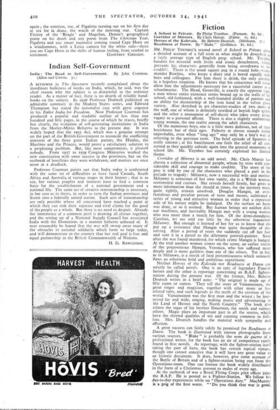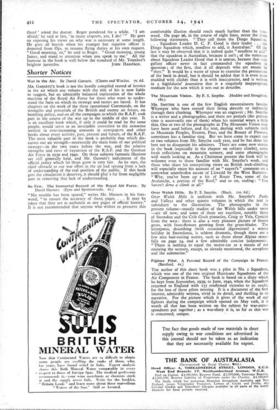Fiction
MR. PHILIP TOYNBEE'S second novel A School in Private gives a detailed account of a full term in what might be described as a fairly average type of English prep. school. Mr. Toynbee handles his material with lively and ironic detachment, which prevents his characters generally from being overdrawn or in. credibk. There is the usual square peg in a round hole—Corn. mander Rawlins, who keeps a diary and is bored equally with boys and colleagues. For him there is drink, the only comfort in a hopeless situation. He knows that his conscience will never allow him the adjustments necessary for a successful career as a schoolmaster. The Head, Grenville, is exactly the opposite type, a man whose entire existence seems bound up in the walls of his school, old-fashioned, with a well-founded dislike of parents and an ability for dictatorship of the iron hand in the velvet glove variety. Also sketched in are character-studies of two more of the staff, one of whom is definitely terrified of boyish high spirits and the other a monument of self-deceit who takes every infant vagary as a personal affront. There is also a slightly sentimental young woman, the one ,realist among the adult characters.
Of the numerous boys, one is a little more dubious, not of their boyishness but of their ages. Puberty at eleven sounds rather improbable, even when " long ago " may only be a boy's way of referring to the previous term. The brief episode of Sparrow is really sinister ; at his banishment one feels the relief of all con- cerned as they quickly subside again into the general monotony of school life. Mr. Toynbee has certainly exploited his limited theme.
Corridor of Mirrors is an odd novel. Mr. Chris Massie has chosen a collection of abnormal people, whom he tries with con- siderable skill and courage to make credible. The story of the past is told by one of the characters who played a part in the prelude to tragedy : Mifanwy, now a successful wife and mother. Mifanwy is conscious of her own vanity, she is a Welsh woman, sentimental and curious. She reveals herself firmly, but gives us more information than she should at times, for the mystery must, quite rightly, remain unsolved. Douglas Mangin, an over- fastidious and peculiar person of taste and means, cultivated a series of young and attractive women in order that a repressed side of his nature might be indulged. On the surface no harm was done, or so it seemed. But human beings are neither dolls nor machines, and inevitably Mangin met with a young woman who was more than a match for him. Of the demi-mondaine, Caroline, we are told too little by the otherwise loquacious Mifanwy. But enough is learned of her for us to know that she put up a resistance that Mangin was quite incapable of dis- solving. After a period of years she suddenly cut off her hair and sent it in a parcel to the dilettante portrait-painter. Soon after she was found murdered, for which crime Mangin is hanged. At the trial another woman comes on the scene, an earlier victim of the preposterous Mangin, Veronica, who has suffered more deeply and is more guiltless than any of the others. Yet in her, as in Mifanwy, is a streak of fatal pretentiousness which seriously flaws an otherwise bold and ambitious experiment.
Neither Heroes of the Kalevala nor Readiness at Dawn can strictly be called novels. One is an epic of legendary Finnish heroes and the other is reportage concerning an R.A.F. fighter- station during the present war. Of the former, Mrs. Babette Deutsch writes in a brief note : " The original is made up of fifty runes or cantos. They tell the story of Vainamoinen, the great singer and magician, together with other more or less related tales, and such legends as the myth of the creation of the world. Vainamoinen was the first man and the wisest ; he jour- neyed far and wide, singing, making music and adventuring in
the Land of Heroes and the North Country." The book also relates the sagas of his brother Ilmarinen, the smith and various others. Magic plays an important part in all the stories, which have the shrewd qualities of wit and cunning common to folk- lore. Mrs. Deutsch handles the material with sympathy and affection.
A great success can fairly safely be promised for Readiness at Dawn. The book is illustrated with sixteen photographs from various sources. " Blake " is probably the nom de guerre of a
professional writer, for the book has an air of competence rarely found in first novels. As reportage, with the fighter-station itself taking the part of hero, the book has certain topical virtues, though one cannot conceive that it will have any great value as an historic document. It does, however, give some account of the Battle of Britain and of a fighter-station being run from the Operations-room. One can foresee the book widely distributed in the form of a Christmas present to males of every age.
At the outbreak of war a Royal Flying Corps pilot officer joins the R.A.F. He is posted to a Fighter-Station. We follow his
day-to-day txperiences while on " Operations duty." MacMurrav is a prig of the first water. " 'Do you think that war is good, then? ' asked the doctor. Roger pondered for a while. ' I am afraid,' he said at last, in many respects, yes, I do! ' " He goes on exposing his views on why war is necessary at some length. He goes. all boyish when his younger but superior officer is demoted from Ops. to resume flying duties at his own request. " Good morning, sir," he said to Roger. " Good morning, young James, and stand to attention when you speak to me." All the humour in the book is well below the standard of Mr. Toynbee's



























 Previous page
Previous page